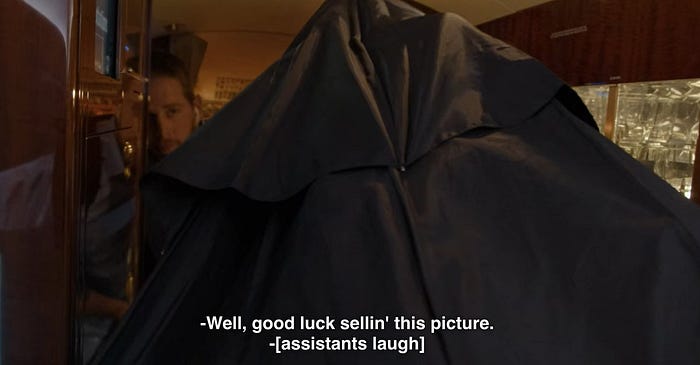Filtered for Swift, Lockwood, NFTs and “excitement.”
It’s Wednesday, and it’s been a while, so here are some links.

Hey hey, what’s up. How are you? I’m good. Not much happening here, pretty quiet all around. Someone may have mentioned that you like links? Here are some for you.
NFTs and crypto-art, from a practicing artist, who thinks, on balance that (ultimately) it’s a good idea, by Rev Dan Catt.
Suppose we strip away all the tech-bro bubble, Twitter frothing, headline-grabbing, gold rush, planet-destroying, market flipping, copyright-infringing, bandwagon-jumping, volatility and hot takes. You can say that NFTs are a bit like Patreon as a way to support artists, but instead of paying for unlocked posts and early access to things, you’re buying a token of ownership to an artwork, that doesn’t prevent other people from having that artwork, which you could resell as long as enough other people believe in it.
Malfunctioning Sex Robot, in which Patricia Lockwood gives us 6,767 words on John Updike.
No one can seem to agree on his surviving merits. He wrote like an angel, the consensus goes, except when he was writing like a malfunctioning sex robot attempting to administer cunnilingus to his typewriter. Offensive criticism of him is often reductive, while defensive criticism has a strong flavour of people-are-being-mean-to-my-dad.
Excitement is a fleeting moment, not a steady state, by Jason Fried.
Most work is pretty mundane. Even work on meaningful things. The most profound stuff is built one mostly boring brick at a time. Even the most creative ideas, the best art, the breakthroughs have to be assembled, and assembly isn’t typically what fires people up.”
This, this, one thousand times this. If you don’t get satisfaction from doing the hard work of building things one brick at a time, then you’re probably in the wrong job.
Every Single Album: Taylor Swift. Episodes of The Ringer’s podcast, with Nora Princiotti and Nathan Hubbard. Two huge fans, from different generations, going album by album through the catalog, in chronological order. The whole series probably isn’t for the casual Swift fan, but if I were to recommend just one epiosde, it’d be the one about Reputation, for all the friction and frission that album delivers.
Speaking of which, this 2015 Chuck Klosterman profile of Swift is an excellent pairing to the above pod.
Even within the most high-minded considerations of Swift’s music, there is inevitably some analysis (or speculation) about her personal life. She’s an utterly credible musician who is consumed as a tabloid personality. Very often (and not without justification), that binary is attributed to ingrained biases against female performers. But it’s more complicated than that. Swift writes about her life so directly that the listener is forced to think about her persona in order to fully appreciate what she’s doing creatively. This is her greatest power: an ability to combine her art and her life so profoundly that both spheres become more interesting to everyone, regardless of their emotional investment in either.
Or you could cue up Miss Americana on Netflix, in which she deals with this directly. I watched it again the other night, and was (again) floored by this moment in the film…
I’m trying to be as educated as possible on how to respect people, on how to de-program the misogyny in my own brain. Toss it out, reject it, and resist it. Like, there is no such thing as a slut. There is no such thing as a bitch. There is no such thing as someone who’s bossy, there’s just a boss. We don’t want to be condemned for being multi-faceted.
Sorry that was a real soapbox.
Why did I say sorry!
— Because we’re trained to be sorry.
Yeah, we legitimately are. We’re like “Sorry, was I loud? In my own house that I bought with the songs that I wrote about my own life?”
Queen.
